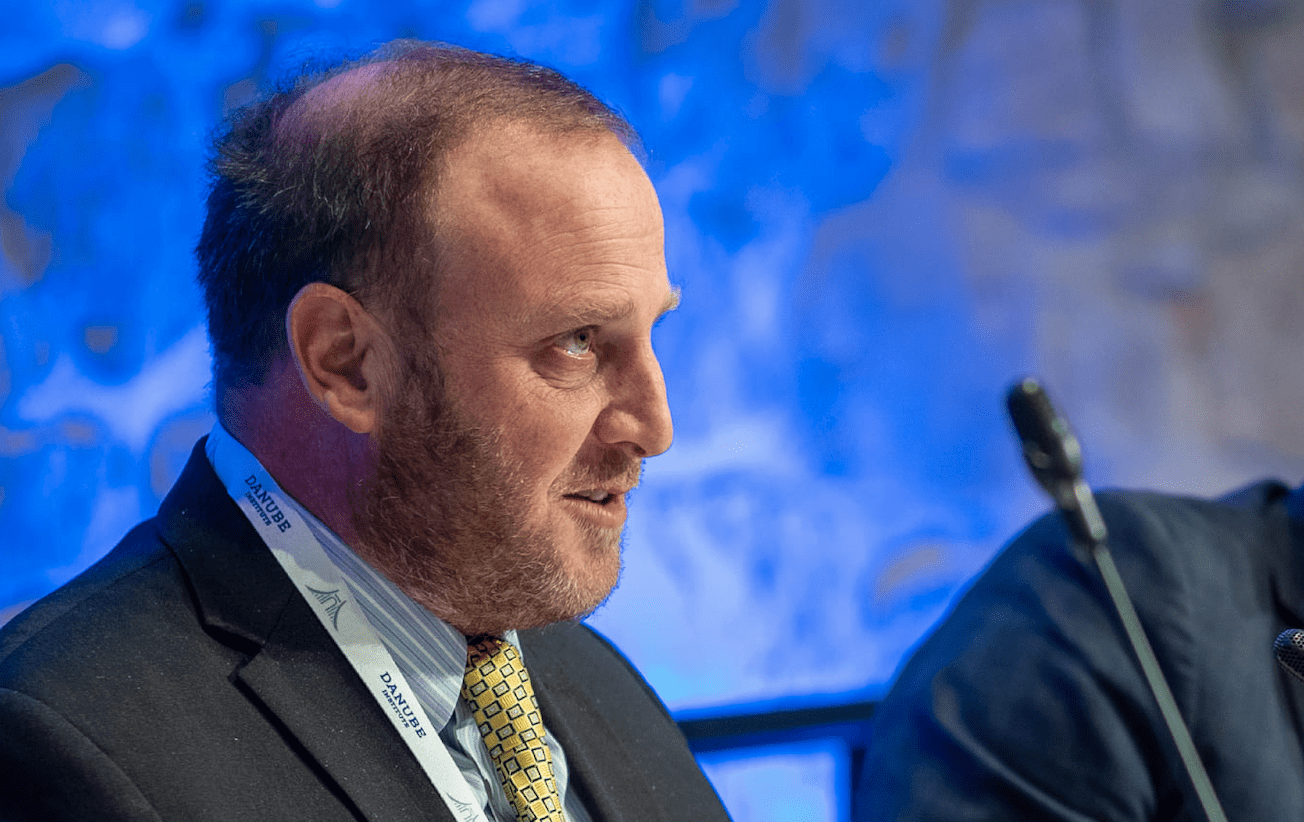Jeremy Carl, Senior Fellow at the Claremont Institute and former Deputy Assistant Secretary in the Interior Department under President Trump
Since the withdrawal of US troops from Afghanistan, more than 100,000 American soldiers have been gradually moved to the EU. Does that mean that President Biden has been preparing for a possible conflict in the EU for quite a long time?
Well, I don’t know if he’s been preparing. It depends on how you define a long time. But I think he’s certainly aware of the current situation and our military personnel are reacting accordingly. I will say that even though I disagree with how Biden has handled this conflict overall, I think that he has certainly been a much less bad actor than some in both parties. I don’t think that he is looking to escalate things with Russia. And I think he’s been quite clear about that. That’s something Prime Minister Orbán has also been very clear about in the Hungarian context. I do think that he is trying to send a message to the Russians through the troop build-up that NATO is a red line. However, in a way that also says Ukraine was not a red line. And I think that is really the message that we are trying to give there. But I don’t think we are looking for a military conflict, obviously.
Now that you mention NATO, do you see any possibility of NATO being not just a red line but eventually joining the conflict and defending Ukraine?
Well, I certainly think that there are those who would like to do that. I am certainly not among them. I think that the question of Ukraine is simply not among the core strategic interests of the United States. That doesn’t mean that we don’t care at all. It doesn’t mean that we just want to let Putin have a free hand. I think that we have done a good job as an alliance of sending a message that this type of behaviour should have costs. But I think direct military involvement is simply not in our interest.
The Russians have said they could deploy nuclear weapons if they were to face an existential threat. Do you think this is just a message like the ones the US side is sending, or is there a real possibility of that happening?
Were Putin to have a first use of nuclear weapons, that would be the end of his regime in any number of ways
Well, I think there is obviously a possibility. I think it is a little bit, or more than a little bit, reckless of Putin to raise that possibility. On the other hand, even though I think what he has done in Ukraine is both morally and strategically foolish, he has done a little bit of using the advantage that somebody like Donald Trump used of having a degree of unpredictability, and that he has now telegraphed that, you know, “hey, I’m willing to do some things that you didn’t think I was willing to do.” And so I think we have to take this very seriously, and not just as bluster. I also think, however, that were Putin to have a first use of nuclear weapons, that would be the end of his regime in any number of ways. Not just because I think that would invite some sort of retaliation, but because it would be a red line beyond all red lines, in terms of American and Allied reaction.
Moving on to energy policy, what could be the short- and long-term consequences of the Russia sanctions regarding Europe’s energy supply?
Well, I think Hungary, or rather, Russia, has been very misguided in terms of looking at a very short-term calculus, when they should be looking at a long-term calculus. And the long-term calculus is that now that they have advertised to Europe that they are not a reliable supplier, a bunch of geopolitical considerations are going to get in the way of whether they are supplying energy. I think Prime Minister Orbán has actually done a very reasonable job of keeping those lines open and saying, “look, you know, we’re not interested in conflating the issue of energy with some of these broader strategic issues.” But I think we now have to think about alternatives for Europe. And I have suggested to American policymakers that when engaging with the Hungarian government, as opposed to pushing Hungary to get involved in a more military capacity here, which I think is certainly a red line for Prime Minister Orbán, they should make alternative methods of energy supply available to Hungary, so that Hungary can make a strategic calculus of becoming not so dependent on the Russians. I think that is in the mutual interests of Hungary and the United States, and the rest of the European allies.
President Biden has recently shut down Russian gas imports to the US. What are, if any, of the consequences of that decision?
Well, you know, I don’t have a lot of confidence in the policymakers running the United States right now. Not just after two years of a kind of a COVID disaster theatre, but in general. So I am very worried, and have been from the beginning, about the second-order effect of the sanctions that we put on the Russians. I mean, clearly, as somebody who opposes the military toolbox being used here, I would like to see Putin having some consequences, and we do need to have those in the economic domain ultimately. But I do worry a lot that the left hand doesn’t know what the right hand is doing here. And that we may be doing some things simply because it feels good, whereas everything we do should be because it serves our strategic interests. And I worry, judging from some of the comments that I have seen from Biden and other senior US policymakers, that we are trying to make moral points, rather than guard our strategic interests.
What impact could such a decision have on alternative energy sources? Could the use of renewable energy increase as a result?
Well, I think this is one of those things where the administration is just not being all that serious. I mean, over a very long period of time, there is some fungibility between renewable energy and oil. And in a more short-term period, renewables can step in for gas, but we are a long way away from having the sort of storage capacity and some of the other technical capabilities to really offer renewables as any sort of, you know, fundamental, long-term alternative to oil. Even a guy like Elon Musk, whose entire business is based on replacing the internal combustion engines with EVs, said, basically, what was essentially the equivalent of ‘drill baby drill’. So over the long term, of course, we should pursue any alternatives that lead us to be less dependent on Russian supply. And I think we will take steps in that direction. But over the short term, itis really irresponsible to suggest that somehow there is some sort of a renewable spigot that we can turn on here that is going to solve our problems.
There is a new US-EU agreement about the US providing LNG for one year to the EU to replace Russian gas. Can this deal serve as an alternative to Russian gas? Or to put it in another way, can the US provide enough gas to replace Russian energy?
Well, I think we can, at the right price point. The question is whether that price point will be acceptable to Europe. Historically, it has not been. I think that calculus may have changed. Of course, the other thing that depends on is Biden not making it more difficult to drill for fossil fuels, which historically he has done. We will see If that calculus changes, but even here in my home state of Montana, which is not an energy superpower house, but does have some resources, we are beginning to see drilling rigs having sort of marginal resources start up again. Because ultimately, I think, you know, they see markets in Europe and other places as willing to pay higher prices than they were previously. And in this higher price environment, it is viable for us to have significantly increased supply.
Why is it better to bring the US LNG to the EU by tank ships than to get the Russian gas to the various countries via pipelines?
I think the key message that we need to deliver here is that clearly, we cannot be strategically dependent
I mean, obviously, it is a global market. And so it will be interesting to see how these things transform themselves over time. But I think the key message that we need to deliver here is that clearly, we cannot be strategically dependent. Nobody can be strategically dependent on these Russian resources. Whether we choose to take these Russian resources at any given time at a reasonable market price, that’s a separate question. But we have to have at least the capability of bringing online quickly. That is just one of the many reasons why Germany’s nuclear shutdown was so foolish. I mean, it cost the German taxpayers a lot of money in the short term and reduces strategic flexibility in the long term. And, of course, it also is bad for the climate. So there is a lot of magical thinking inhabiting Germany and other parts of Europe, and hopefully, that is going to go away as a result of this.
Let me ask you, out of sheer curiosity, is it not worse from an environmental point of view to import LNG in tanker ships than to import it by pipelines? Will that not result in a larger carbon footprint?
Yeah, there is no question that just the nature of liquefied gas will increase its environmental impact. However, gas remains a very clean-burning fuel with respect to traditional pollutants. But certainly, its carbon advantages versus coal diminish a lot when you liquefy it. But look, I mean, there have to be other strategic considerations. Ultimately, I think the advantage when you build these other delivery mechanisms is that you don’t necessarily need always to be using them. It’s just merely the ability to use them at any given time, which then reduces the ability of the Russians or other bad actors to engage in strategic blackmail against you. So that’s what I think this is really about. It’s not that Europe necessarily wants to have half of its LNG, or half of its natural gas, being supplied by the US over the long term. But you do want the capability to do that there. And that’s a very different thing.
What do you think about the relationship between Joe Biden and the US oil companies? As far as I know, it has been quite a hostile relationship, but now Biden seems to be needing them more than before. Do you agree with that assessment?
Well, I mean, it’s fascinating. It’s one of these tests that the Democrats have generally really been failing at, over the first year of the Biden administration, you know, of whether they’re willing to put aside kind of appealing-to-the-base, silly policy priorities, to focus on more strategic things. I think Biden, at least to the extent that his capacity is not completely diminished, is intellectually capable of understanding, now that the balance has changed, that he is going to need to work with these oil and gas companies in a much more fundamental way over the short to medium term, to bring on supply, and that it is his bigger, strategic interest. Whether in fact, however, he is so captive to interest group politics within his own coalition that for him to do that becomes functionally not possible, really remains to be seen.
Do you think Biden’s friendly tone will last after the crisis?
I think it will, even at my most cynical about Biden. The Democrats, I think that they have to moderate a little bit, because they are going to realize as they talk to the Europeans that getting these energy resources is a non-negotiable thing. And that it is a broader strategic priority for Biden than dotting an extra “i” or crossing an extra “t” on the climate agreement. So I think the hostility will turn down to some degree, and the cooperation will increase. The question is to how much of a degree, and I think it is just very hard to know at this point.
Could this new situation benefit Donald Trump in any way?
Europeans were not being serious enough about their independence and their contributions to NATO
Well, I mean, I think it certainly should, because, as have many things that have happened during this administration, this situation has validated President Trump’s approach, which was always that the Europeans were not being serious enough about their independence and their contributions to NATO. Now, Europe is really singing from that same hymnal. I saw a really interesting interview that Prime Minister Orbán gave to Mandiner, where he basically said the same thing. Germany, I think, even more to the point, has, under a socialist government, said the same thing, so that validates them. Secondly, it has validated Trump’s real push for American energy dominance, our ability to not only fully supply ourselves, but be able to have that export ability. So as much as the US press, which just hates Trump, you know, is going to want to diminish these realities, I think, outside of the US, and even with people paying attention in the US, I think it is pretty obvious what is happening, and that Trump’s approach has been validated pretty dramatically. And not just that, but the fact that Putin chose to go in under Biden, and not under Trump, because I think he perceived correctly that, you know, maybe Trump wouldn’t have had the reaction that Biden had. And even though I don’t necessarily deplore the reaction that Biden took here, at least not in all its manifestations, the best thing you can do in fact is deter your adversaries’ actions in the first place. And that’s where Trump, through his strategic unpredictability, did a very good job.
Finally, what do you think could be the solution for the energy crisis this war has caused?
Well, I mean, I think you are seeing some of it right now. Which is people getting more serious, bringing supply back online, planning for a higher price, and the world being less dependent on the Russians. I think some politically sensitive suppliers will also look at what has happened to the Russians and how they have lost a tremendous amount of long-term leverage for their behaviour. It will reinforce their views that this is not how they should act. So I think that will be a good thing over the long term. Look, renewables and other forms of supply can also play a significant role here over time in changing the equation, and to the extent that we can do that in a reasonably cost-effective way, I’m all for it. We have certainly moved in the electric vehicle space in a decade and a half from science projects to things that are reasonably economically competitive in certain spaces. And I think we can see a crossover point where they become fully economically competitive shortly, and that also, of course, gives them the ability to, at least in theory, run off electricity, and we are in renewables. So I think there are some real changes that once we get there will be positive, but if you understand global energy infrastructures, these are absolutely enormous shifts. It takes a long time to do this. This is a very large ship that will not turn on a dime. So we are talking about a strategic change that will take place over decades, not months.








